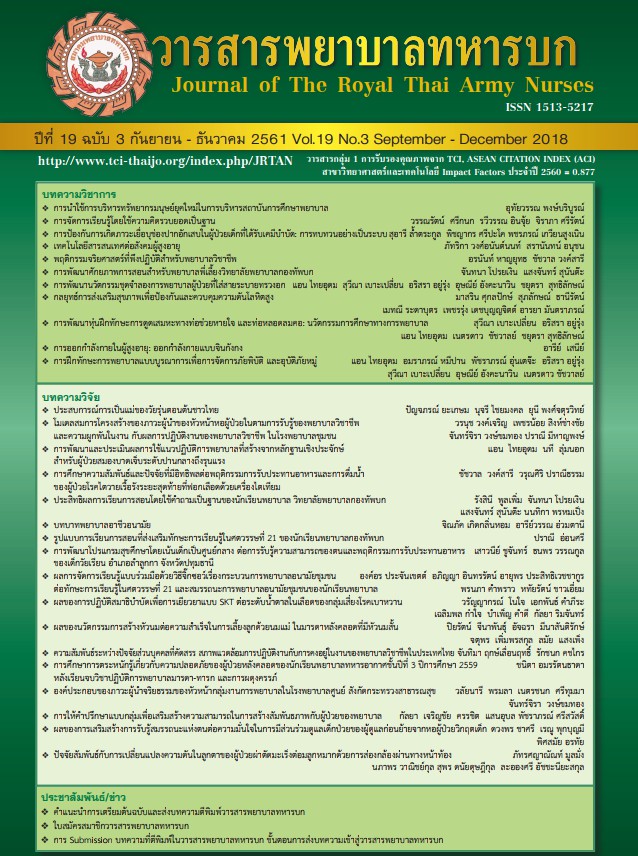The study of Relationship and Factors Influencing of Dietary and Fluid Consumption among End Stage Renal Disease Patient Receiving Hemodialysis
Keywords:
factors relationship, factors influencing, dietary and fluid consumption, patient receiving hemodialysisAbstract
This study aimed to 1) The relationship between personal factors and perceived health status and behavioral among end-stage renal disease patients receiving hemodialysis and 2) factors influencing of dietary and fluid consumption among end stage renal disease patient re-ceiving hemodialysis. The samples were patient with end stage renal disease treated with he-modialysis at one private hospital in Bangkok, Thailand. A total 137 patient were selected by inclusion criteria and multi-stage random sampling. The study instrument consisted of demo-graphic data questionnaire personal data questionnaire, perception of end-stage renal disease patients receiving hemodialysis questionnaire, and factors influencing of dietary and fluid con-sumption among end stage renal disease patient receiving hemodialysis questionnaire. The data were analyzed using descriptive statistics, Pearson’s product moment correlation coefficient and stepwise multiple regression The major finding were as follows; (1) The perception of risk, perceived benefits, per-ception of obstacles in behavioral, perception of self-confidence, perception of violence, have to ever treatment with volume overload, perception of positive behavioral factors, and educational level were positive significant of dietary and fluid consumption behavior (r = .546, .510, .508 , .473, .379, .177 , .177 and .134, p<.05 respectively). (2) Factors influencing of dietary and fluid consumption among patients include the perception of self-confidence, perception of obstacles in behavioral, perceived benefits, and perception of risk were significant predictors that could explain 66.7% (R2 = .667,p<.05 ). By conclusion, The perception of risk, perceived benefits, perception of obstacles in behavioral were positive significantly behavior, and the perception of self-confidence, perception of obstacles in behavioral, perceived benefits, and perception of risk is the factors that should be developed as a program for enhancing the perception of healthy dietary and fluid consumption behavioral among end-stage renal disease patients receiving hemodialysis and re-education.
Downloads
References
2. Theptrakanporn,S.,Mongkongsumrit,S.,Keawdok, T.,Vatthanasuy.S.,Rakkapoa,N. Evaluation and lesson distilled on implementation of Chronic Kidney Disease clinic, under policy of Ministry of Public Health. Bangkok: Faculty of Health Sciences Thammasat University: Re-search Report. 2017. (In Thai).
3. Chuasuwan, A., Praditpornsilpa, K.. Thailand renal replacement therapy year 2014. Report of The Nephrology Society of Thailand, 2014. (In Thai).
4. Kidney Disease Association of Thailand. Hemodialysis Clinical PracticeRecommendation 2014. Bangkok : October prints, 2014. (In Thai).
5. Wongsaree,C. Nursing Care on Receiving Hemodialysis Patient with the Health Teaching. EAU Heritage Journal Science and Technology. 2015; 9(1): 15-24. (In Thai)
6. Wongsaree,C. Kidney & Urinary disease : Medical and Surgical Nursing Care .Bangkok; N P Press Litmited Partnership, 2016. (In Thai).
7. Wongsaree,C., and Kittiyawan, J. An Intensive Educational Program on Therapeutic Vo-lume Overload for End Stage Chronic Renal Disease Patients Receiving Hemodialysis: Hemodialysis Nurses’ Roles. HCU journal. 2017; 21(41):137-150. (In Thai)
8. Wongsaree,C. Effects of an intensive educational program on fluid restriction knowledge and behaviors in end stage renal disease patients on receiving hemodialysis [Thesis MS.N. in adult Nursing ]. Huachiew Chalermprakiet University: Samutprakarn. 2014. (In Thai).
9. Wongsaree,C.,Harnyut,O. The Nursing Process in End - Stage Renal Disease Patients on Receiving Hemodialysis. Journal of The Police Nurse. 2014; 6(2):220-233. (In Thai).
10. Varitsakul, R.Data Management in Healthcare Delivery for Chronic Kidney Disease Pa-tients. Journal of The Royal Thai Army Nurses. 2017; 18 (1): 122 – 130. (In Thai).
11. Rosenstock, Irwin M., Victor J. Strecher, and Marshall H. Becker. Social learning theory and the health belief model. Health education quarterly. 1988; 15 (2): 175-183.
12. Krejcie, R. V., & Morgan, D. W. Determining sample size for research activities. Educa-tional and Psychological Measurement.1970; 30: 607-610.
13. Bandura, Albert. The self system in reciprocal determinism. American psychologist .1978; 33(4) : 344.
14. Maio, Gregory R., et al. Attitudes and intergroup relations. The SAGE handbook of preju-dice, stereotyping, and discrimination, 2010: 261-275.
15. Wongsaree, C. Perception of and Self-management in Sexuality Dysfunction among Male Patients with End-Stage Renal Disease Receiving Hemodialysis.
Journal of Nursing Science Chulalongkorn University. 2016; 28(3): 55-67. (In Thai).
16. Budsankom,P.Selection of predictive variables in multiple regression equations. Journal of education Mahasarakham University. 2012; 17 (1): 43 – 60. (In Thai).
Downloads
Published
How to Cite
Issue
Section
License
บทความหรือข้อคิดเห็นใดใดที่ปรากฏในวารสารพยาบาลทหารบกเป็นวรรณกรรมของผู้เขียน ซึ่งบรรณาธิการหรือสมาคมพยาบาลทหารบก ไม่จำเป็นต้องเห็นด้วย
บทความที่ได้รับการตีพิมพ์เป็นลิขสิทธิ์ของวารสารพยาบาลทหารบก
The ideas and opinions expressed in the Journal of The Royal Thai Army Nurses are those of the authors and not necessarily those
of the editor or Royal Thai Army Nurses Association.






